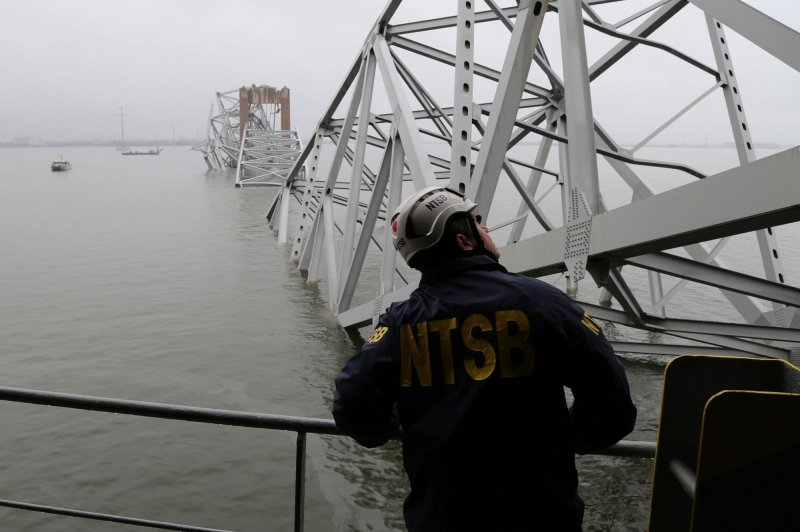National Transportation Safety Board investigators survey the cargo vessel Dali which struck and collapsed the Francis Scott Key Bridge in Baltimore, Md. Crews on Sunday began cutting into and removing parts of the wreckage in an effort to open up a channel and get more vessels into the water. Photo by Peter Knudson/NTSB/UPI |
License PhotoMarch 31 (UPI) — Crews began cutting into portions of the collapsed Francis Scott Key Bridge in Baltimore on Sunday, starting the complex and dangerous job of clearing the Patapsco River.
The Dali container ship that crashed into the bridge’s support and caused it to collapse on Tuesday was still trapped under the rubble on Sunday while cranes began offloading and processing removed bridge pieces at a nearby industrial port.
Three dive teams, meanwhile were surveying submerged sections of the wreckage.
Clearing the wreckage will allow search teams to continue looking for the remaining victims of Tuesday’s bridge collapse. Four of the eight workers who were on the bridge are still missing and presumed dead.
Federal and state officials on Sunday also stressed the importance that the now blocked Port of Baltimore has on the national economy.
“This port is one of the busiest most active ports inside of the country. This is going to impact the farmer in Kentucky, the auto dealer in Ohio, the restaurant owner in Tennessee,” Maryland Gov. Wes Moore said Sunday on CNN’s State of the Union.
The waterway is expected to be closed off for over a month, but it is unclear how long it would take to remove the whole bridge and have it replaced.
U.S. Transportation Secretary Pete Buttigieg on Sunday said the Army Corps of Engineers doesn’t want to give an exact timeline until it assesses the damage to the underwater infrastructure and gets a clearer picture of the supply chain issues.
Buttigieg said the original bridge took about five years to construct, but that was not an indication of how long it would take to replace.
“This is going to be a very complex process,” Buttigieg said. “There are, even now, forces acting on that steel, so it takes a lot to make sure that it can be dismantled safely, to make sure that the vessel stays where it is supposed to be and doesn’t swing out into the channel.”
White House Senior Adviser Tom Perez called the bridge removal a “Herculean undertaking” and vital to minimizing the economic impact of the collapse.
“The Port of Baltimore will be back,” Perez told MSNBC’s The Weekend. “The president has said this. We’re going to move heaven and earth to make sure we rebuild the bridge, we clear out the debris as soon as possible, so that we can minimize these disruptions.”
Perez said President Joe Biden plans to visit Baltimore, but the plan is yet to be finalized.
Buttigieg said Biden may have to turn to Congress to approve the federal funding that would cover up to 90% of the cost of recovery. Biden earlier this week approved Moore’s request for $60 million in federal funds to pay for initial mobilization, operations and debris recovery.
Moore on Sunday called for a thorough investigation into the cause of the collapse and full accountability.
The ship crashed into one of the bridge’s supports shortly after operators sent a mayday call that they had lost power. The National Transportation Safety Board said its investigation will include information from the ship’s black boxes.
“There needs to be an ongoing investigation as to what happened,” Moore said on Fox News Sunday. “I want that investigation to be speedy. And for anyone who needs to be held accountable to be held accountable.”
The 22 crew members of the Dali were still on board the ship Sunday to monitor engineering spaces and respond in the event of an emergency.
The ship was originally bound for Sri Lanka from Baltimore, so the crew has enough supplies to sustain them. The crew’s living quarters also were undamaged.
“They’re holding up well,” Coast Guard Capt. David O’Connell told CNN. “They were in a, you know, a pretty horrific accident … We can’t lose sight of the tragedy, the human element of that.”
